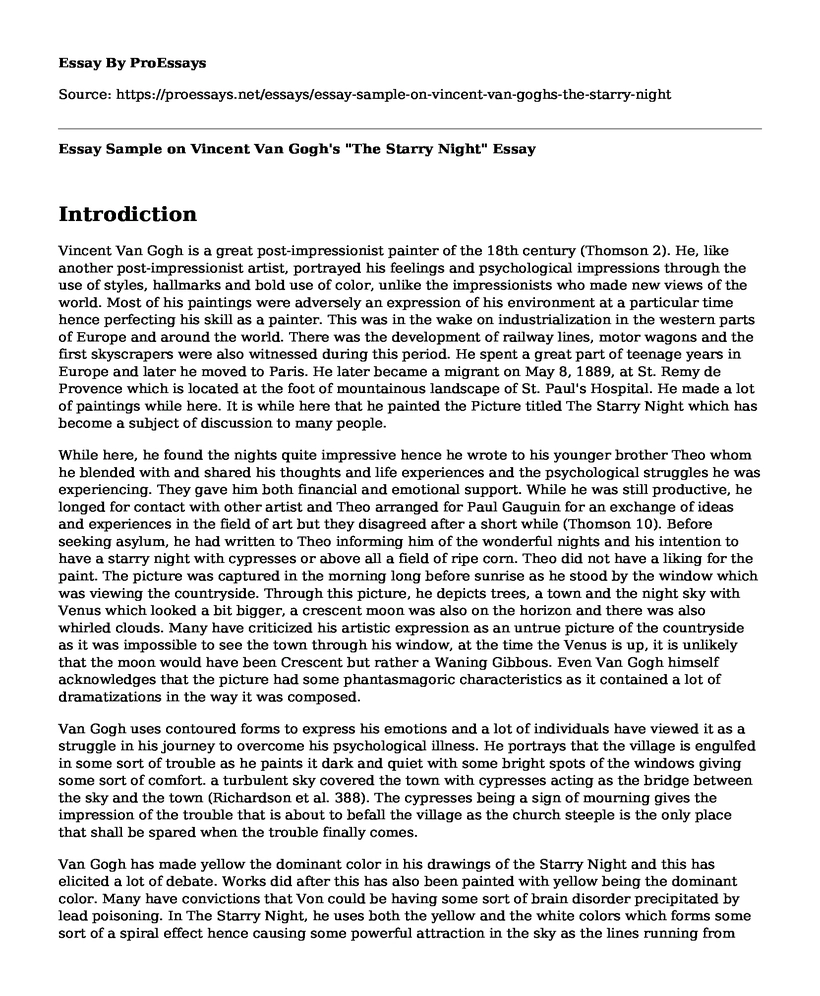Introdiction
Vincent Van Gogh is a great post-impressionist painter of the 18th century (Thomson 2). He, like another post-impressionist artist, portrayed his feelings and psychological impressions through the use of styles, hallmarks and bold use of color, unlike the impressionists who made new views of the world. Most of his paintings were adversely an expression of his environment at a particular time hence perfecting his skill as a painter. This was in the wake on industrialization in the western parts of Europe and around the world. There was the development of railway lines, motor wagons and the first skyscrapers were also witnessed during this period. He spent a great part of teenage years in Europe and later he moved to Paris. He later became a migrant on May 8, 1889, at St. Remy de Provence which is located at the foot of mountainous landscape of St. Paul's Hospital. He made a lot of paintings while here. It is while here that he painted the Picture titled The Starry Night which has become a subject of discussion to many people.
While here, he found the nights quite impressive hence he wrote to his younger brother Theo whom he blended with and shared his thoughts and life experiences and the psychological struggles he was experiencing. They gave him both financial and emotional support. While he was still productive, he longed for contact with other artist and Theo arranged for Paul Gauguin for an exchange of ideas and experiences in the field of art but they disagreed after a short while (Thomson 10). Before seeking asylum, he had written to Theo informing him of the wonderful nights and his intention to have a starry night with cypresses or above all a field of ripe corn. Theo did not have a liking for the paint. The picture was captured in the morning long before sunrise as he stood by the window which was viewing the countryside. Through this picture, he depicts trees, a town and the night sky with Venus which looked a bit bigger, a crescent moon was also on the horizon and there was also whirled clouds. Many have criticized his artistic expression as an untrue picture of the countryside as it was impossible to see the town through his window, at the time the Venus is up, it is unlikely that the moon would have been Crescent but rather a Waning Gibbous. Even Van Gogh himself acknowledges that the picture had some phantasmagoric characteristics as it contained a lot of dramatizations in the way it was composed.
Van Gogh uses contoured forms to express his emotions and a lot of individuals have viewed it as a struggle in his journey to overcome his psychological illness. He portrays that the village is engulfed in some sort of trouble as he paints it dark and quiet with some bright spots of the windows giving some sort of comfort. a turbulent sky covered the town with cypresses acting as the bridge between the sky and the town (Richardson et al. 388). The cypresses being a sign of mourning gives the impression of the trouble that is about to befall the village as the church steeple is the only place that shall be spared when the trouble finally comes.
Van Gogh has made yellow the dominant color in his drawings of the Starry Night and this has elicited a lot of debate. Works did after this has also been painted with yellow being the dominant color. Many have convictions that Von could be having some sort of brain disorder precipitated by lead poisoning. In The Starry Night, he uses both the yellow and the white colors which forms some sort of a spiral effect hence causing some powerful attraction in the sky as the lines running from top to bottom representing the cypress tree and church attempts to break the composition without reversing from the powerful night sky shown in the Starry Night (Richardson et al. 389).
Interpretation of Vincent van Gogh's Painting
As per the painting of Starry night, various interpretation can be derived from it some claim that it depicts the story of Joseph in the bible. Joseph the dreamer who was also sold by his brothers to slavery due to his continuous weird dreams (Richardson et al. 390). The life of Joseph and Van Gogh seems to have a lot of similarities. Just like Joseph who was thrown into a pit after being sold by his own brothers, Van Gogh also went to the asylum. His as an artist was not recognized despite the amount of work that he engaged in to make them better. Some see negative emotion in his work as one of the attributes that lead to recognition of his work. Some claim that his work has a deeper religious meaning, such people may align their claim to the story of Joseph. In conclusion, Van Gogh was an artist that loved the nighttime as depicted by the artwork that he continually perpetuated.
Work Cited
Thomson, Richard. Vincent Van Gogh: The Starry Night. The Museum of Modern Art, 2008.
Richardson, Bradford A., et al. "Neuroanatomical Interpretation of the Painting Starry Night by Vincent van Gogh." Neurosurgery 81.3 (2017): 389-396.
van Gogh-Bonger, Jo, and Martin Gayford. A Memoir of Vincent van Gogh. Getty Publications, 2018.
Cite this page
Essay Sample on Vincent Van Gogh's "The Starry Night". (2022, Oct 27). Retrieved from https://proessays.net/essays/essay-sample-on-vincent-van-goghs-the-starry-night
If you are the original author of this essay and no longer wish to have it published on the ProEssays website, please click below to request its removal:
- Child Crisis Arizona: Speech
- Film Analysis Essay on Meet the Parents
- Freeman of Color Essay Example
- Artists View Photography Essay
- Essay Sample on Rethinking Modernism
- Essay Example on America's Got Talent: Platform for Talented Performers to Shine
- Essay Sample on Documentary Photography: War, Struggles, & Silence in DRC's North Kivu







